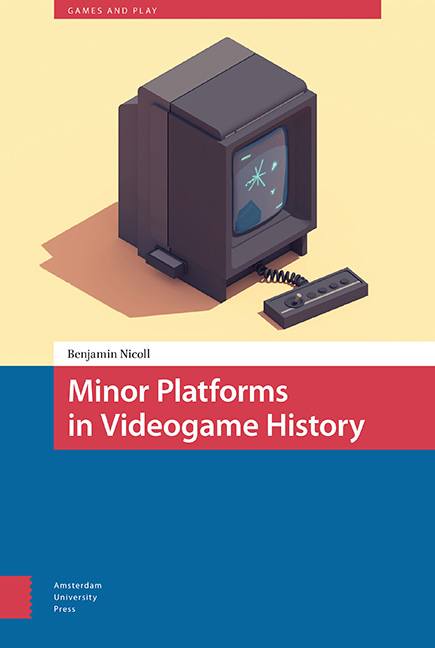Book contents
- Frontmatter
- Contents
- List of Tables and Figures
- Acknowledgements
- Introduction : Failed, Forgotten, or Overlooked? Methods for Historicizing Minor Platforms
- 1 Ways of Seeing Videogame History: The Vectrex as a Transitional Platform
- 2 Articulations of Videogame Piracy: The Zemmix as a Decolonial Platform
- 3 Domesticating the Arcade: The Neo Geo as an Imaginary Platform
- 4 A Dialectic of Obsolescence? The Sega Saturn as a Residual Platform
- 5 ‘How History Arrives’: Twine as a Minor Platform
- Conclusion: ‘Something new in the Old’
- Index
3 - Domesticating the Arcade: The Neo Geo as an Imaginary Platform
Published online by Cambridge University Press: 21 November 2020
- Frontmatter
- Contents
- List of Tables and Figures
- Acknowledgements
- Introduction : Failed, Forgotten, or Overlooked? Methods for Historicizing Minor Platforms
- 1 Ways of Seeing Videogame History: The Vectrex as a Transitional Platform
- 2 Articulations of Videogame Piracy: The Zemmix as a Decolonial Platform
- 3 Domesticating the Arcade: The Neo Geo as an Imaginary Platform
- 4 A Dialectic of Obsolescence? The Sega Saturn as a Residual Platform
- 5 ‘How History Arrives’: Twine as a Minor Platform
- Conclusion: ‘Something new in the Old’
- Index
Summary
Abstract
This chapter looks at the shift from public to private forms of play in videogame history through the lens of the Neo Geo Advanced Entertainment System (AES). The Neo Geo AES is a ‘home arcade’ platform released by Japanese videogame company SNK in 1991. It promised to fulfil a long-term fantasy of bringing ‘arcade quality’ videogames into the home. Although the Neo Geo AES arguably succeeded in this goal, its magazine reception was overwhelmingly negative. Through an analysis of magazine discourses, I argue that the Neo Geo AES's ‘failure’ was due to wider discursive, affective, and social shifts in videogame culture, as opposed to flaws in its hardware or software.
Keywords: videogame arcade, domestication, Neo Geo, videogame magazines, gamer habitus
In The Arcades Project, Walter Benjamin (1999) chronicles various discourses, objects, and texts from the era in which the Paris arcades of the 1820s thrived. He presents these historical sources as constellated fragments that can be used to reconstruct the ruins of early modernity and identify the wellsprings of consumer capitalism. The arcades are treated as a relic of the moment when technologically propelled modes of industrial engineering fused with new forms of urban planning and architecture to create these burgeoning consumer environments. A key element of Benjamin's project is to reawaken the media ‘imaginary’ of the 19th century in order to see what it can reveal about the lost and forgotten ‘dream worlds’ (Buck-Morss, 1991) that once enveloped the Paris arcades. As he writes, ‘all technology is, at certain stages, evidence of a collective dream’ (Benjamin, 1999: 152 [F1a,2]).
Taking influence from Benjamin, this chapter seeks to recover the popular imaginaries associated with the Neo Geo Advanced Entertainment System (AES), a ‘home arcade’ console developed by Japanese videogame company SNK in 1991. The Neo Geo AES's main drawcard is its alleged capacity to reproduce the experience of playing arcade videogames in the home. To this end, the platform is designed to support high-quality ports of software originally designed for use on arcade machines, and its controller features a joystick and button layout reminiscent of arcade-style control schemes. Videogame magazines of the 1980s and early 1990s often presented the arcade and its videogames as benchmarks against which home console hardware and software should be evaluated
- Type
- Chapter
- Information
- Minor Platforms in Videogame History , pp. 105 - 132Publisher: Amsterdam University PressPrint publication year: 2019



